Live Reporting
- This year's Olympics Games have been thrown into doubt because of the coronavirus pandemic, with athletes and officials calling for a decision about Tokyo 2020 to be made quickly by the International Olympic Committee (IOC).Here are some of the most significant developments:
- Canada became the first major nation to withdraw from the Games
- Australia's team says it is "clear" the Games cannot go ahead
- Poland has also called for the event to be moved because of "increasingly limited training options" for athletes
- World Athletics president Lord Coe says the Games must be postponed because they cannot be held "at all costs" and the move is "owed" to the athletes
- Japanese Prime Minister Shinzo Abe has admitted for the first time that the Games could be postponed
The IOC has given itself four weeks to decide on the future of the event.Options include a delay of several months or - more probably - a year. The IOC says cancellation is "not on the agenda". A "scaled-down" Games will also be considered.The Olympics are scheduled start in Tokyo on 24 July. - Many in China are having a good giggle today at an image that has gone viral on the Sina Weibo microblog: of a woman with a specially designed face mask with a cap, so that she can drink through it with a straw.Whether the mask works or not is up for debate, but it’s nevertheless put a smile on Chinese netizens’ faces, especially as many are seeing life coming back to some sort of normal, after almost two months in self-isolation.More than 11,000 users are using the hashtag #MilkTeaMask, and joking about the commitment that has been made to perfecting the mask’s design so that the straw fits snugly, and users can drink without touching their faces. Some online manufacturers are even rushing to replicate it.It’s become a light-hearted joke online in China that people’s love of iced, milky teas has not stopped them drinking responsibly. In late February, one tea shop in the central city of Changsha put metre-length markers down a busy pedestrian street, so that people could practice social distancing and still enjoy a beverage.
- Latin America is steeling itself. It's a region with pockets of extreme poverty, which are often concentrated in either densely packed urban areas or very remote regions.So far, the numbers are small compared to other parts of the world, as it is at an earlier stage of the pandemic.Brazil and Ecuador are the most affected in the region so far, with 25 and 14 deaths respectively.Here are some of the latest announcements:
- Ecuador introduced a curfew at the weekend, keeping people off the streets from 19:00 to 05:00 local time
- Brazil's President Bolsonaro has been at odds with his country’s regional authorities, telling CNN Brasil he disagrees with their decision to close businesses. He called São Paulo Governor João Doria a “lunatic” for imposing a 15-day shutdown. One of the president’s major influencers, US-based former astrologer Olavo de Carvalho, has been criticised for broadcasting a message online saying the virus is a hoax and there has not been one death from it
- El Salvador has introduced a strict new curfew and is detaining those who don’t comply. The justice minister says 327 arrests were made up until 22:30 Sunday night.
- Mexico’s President Andrés Manuel López Obrador has ruled out any curfew or troop deployments, saying they would be too authoritarian. However, in Mexico City, the mayor is closing museums, gyms, bars, theatres and more, from Monday until 19 April. Shopping malls and restaurants will stay open, and gatherings are being limited to 50 people
- The world will take years to recover from the coronavirus pandemic, the Organisation for Economic Co-operation and Development (OECD) has warned.Angel Gurría, OECD secretary general, said the economic shock was already bigger than the financial crisis. He told us at the BBC that it was "wishful thinking" to believe that countries would bounce back quickly.The OECD has called on governments to rip up spending rules to ensure speedy testing and treatment of the virus.
- Thousands of fast food restaurants are set to close across the UK on Monday.On Friday, Prime Minister Boris Johnson said restaurants and cafes must close on Friday, but exempted takeaway food and drink.Among those to shut their doors to customers for both eat-in and takeaway are:
- Nando's has announced it has closed all of its restaurants, about 400 locations
- Sandwich shop Subway is to close its 1,700 franchises from 17:00 GMT
- McDonald's says it will close all 1,270 of its restaurants from 19:00 GMT
- Coffee chain Costa will shut its 2,000 shops by the end of Monday
Retailers have also been hit as the impact of new measures to tackle the coronavirus are rolled out.- Laura Ashley is to permanently close 70 stores, affecting 721 jobs
- Primark's 189 UK stores have closed "until further notice"
- Other High Street retailers, such as John Lewis and Timpson, have already announced closures amid the pandemic
- We may be washing our hands religiously these days, but what about our phones and other devices, which we handle all the time? Here's a quick guide on how to do a thorough wipe-down of your mobile, and what to use when cleaning it.
Video content
- An intensive care nurse in a London hospital has warned people to stick to social distancing guidelines, after photos were posted online of busy parks in the capital.The nurse, who asked to remain anonymous, told the BBC: "Most people will know, or are, a 60-year-old man with a heart condition. If that man gets coronavirus, statistically he's going to die. So think about that - do you want to lose your uncle, your dad, or your own life?"Everyone will end up knowing someone who has either had it or even died from it. This is not a joke."He also said that while nurses know their career is "going to be stressful" when they go into it, right now it's "a completely unknown entity"."We can try our best, and we are. But the problem is that we don't know how bad it's going to get - so how can we really say we're prepared when we don't know the extent of the situation?"If things in the UK get as bad as in Italy, he adds, "no healthcare system can prepare for that".
- Over the weekend we saw people in the UK flouting official advice, travelling to tourist hot spots and crowded markets. But nations across Europe have also struggled to enforce tight new restrictions.On Monday, officials in Belgium said Brussels police had issued 288 penalty fines in just 24 hours - the highest number since confinement rules came into force in the country. Those punished included couples eating in parks, people drinking beer outside cafes and bar owners refusing to shut up shop.Authorities in France have issued thousands of fines, and have deployed drones to enforce the strict lockdown rules. Some charities last week even alleged police had fined homeless people for not self-isolating, although this is unconfirmed.In Germany, Chancellor Angela Merkel announced on Sunday a ban on all gatherings of more than two people who aren't family. It came just days after police in the state of Bavaria shut down a number of public "corona parties", organised by young people on social media. Premier Markus Söder called the gatherings "a real threat".
- "You might not like this, but it’s because we care." That’s how Moscow’s mayor, not known for his human touch, began an address to city residents, ordering the over-65s and anyone with serious health conditions to stay at home."My dear, older Muscovites… grannies and grandads," he began, telling them that from Thursday, they should only go to work if their role was absolutely vital and only go outside to the chemist's or to get food.Sergei Sobyanin said the coronavirus pandemic was "raging" on Russia’s borders, although he still insisted the situation inside the country was "more or less calm" for now.That kind of messaging has created some confusion, even complacency, in recent weeks.But the number of confirmed cases is now increasing on a familiar trajectory and is highest in Russia’s capital, at 262.So Moscow is bracing itself. The streets are far quieter; schools, galleries and gyms are all closed. Many people, including the elderly, have already moved to their dachas, or country houses, where they’re hoping to sit out this crisis.
- The death toll in Spain has reached 2,182, the government has announced, after 462 people passed away in the past 24 hours.
- South Korea is at a critical juncture. Its strategy - an aggressive use of technology to trace the virus and the mass testing of all who’ve been in contact with the infection - appears to be working.The aim is to re-open schools in two weeks. Meanwhile, spring has arrived and people are eager to enjoy themselves. The sense of solidarity that this is a battle to be won together is crumbling slightly.The government is urgently reminding everyone to maintain social distance for the next 15 days. Officials are hoping their stark warnings will encourage people to stay in line.Doctors, meanwhile, are discussing the next possible steps. The trace, test, treat approach will continue. But what happens when classrooms become infected? Do they isolate the entire school? Shut down all schools again?The head of the National Medical Committee, Dr Oh Myoung-don, has told reporters that there could be another spike once schools re-open.The paradox of South Korea’s success is that, having worked so hard to lower infection rates, their medics have to keep going.It’s a bit like climbing a steep mountain without knowing how far the peak will be. The dire situation in Europe hangs over the country like a warning - that if they slip up just a bit, that could be their fate too.
- Here's an update for rail users in the UK.Reduced timetables across the country mean fewer services are operating from Monday. The move has been made because more people are working from home, and in order to free up tracks for freight trains to move products around the country.The government has just announced that many ticket holders will be entitled to a refund.Those with an advance ticket will be able to get a refund free of charge, while all season ticket holders can claim a refund "for time unused on their tickets free of administrative charges".Ticket holders should contact their operator for details, the Department for Transport says.Transport Secretary Grant Shapps said the refunds were available "to ensure no-one is unfairly out of pocket for doing the right thing".
- Governments around the world are advising people to socially distance themselves in order to reduce pressures on health services and stop the spread of the virus.This applies to all, even sitting MPs, as seen here in the Australian parliament in the capital, Canberra.Restrictions are in place to limit the number of people in the chamber and respect social distancing rules.
- Europe is at the centre of the coronavirus pandemic. Here are some of the latest developments:
- Austria: The number of confirmed cases rose to 3,611 on Monday, the health ministry announced - jumping by 367 in a day
- France: At least 674 people have died of the virus in France, including a 67-year-old doctor on Sunday. The national parliament has passed a law declaring a two month health emergency
- Italy: Officials announced the deaths of 651 people in Italy, Europe's worst-hit country, on Sunday - a drop of about a fifth from the record 793 deaths the day before
- Netherlands: The government announced a ban on all flights from Spain for two weeks on Saturday, unless they are carrying Dutch nationals or medical supplies
- One man in Taiwan had a particularly expensive night out after authorities fined him $33,000 (£28,480) for violating his quarantine to go clubbing.The man was supposed to be self-isolating at home for two weeks after returning from Southeast Asia, reported the Asia Times news site.But he was caught partying in the capital, Taipei, on Sunday.Officials called his behaviour “malicious” and charged him with the maximum fine possible.“Those who are caught going out to places that have big crowds and are not well ventilated will be sent to a centralised epidemic prevention facility and fined NT$1 million,” New Taipei city mayor Hou Yu-ih said.“I will not be soft-handed,” he added.Taiwan has been praised for keeping its confirmed cases low, despite its proximity to China. It has reported 195 cases so far and two deaths.But despite having contained the virus, China, South Korea, Taiwan, Singapore and Hong Kong are now facing a second coronavirus wave, fuelled by people entering their borders.This has prompted Taiwan to ban foreigners from entering and making it mandatory for its nationals returning to the country to self-quarantine for 14 days.
- More now on the Coronavirus Bill which seeks to give the UK government new powers to enforce emergency measures.The government will ask MPs to back the bill later.However, it will introduced an amendment to ensure the powers must be renewed every six months, our assistant political editor Norman Smith reports.Some MPs - including former cabinet minister David Davis - had expressed concern that the powers in the bill were so extensive that there should be some sort of time limit to the legislation.The Coronavirus Bill will be debated in Parliament later. Read more about what it involves here.
- I have been driving around Delhi to check how India’s capital city is coping with the complete lockdown, which began at dawn.Popular markets that are usually crowded with shoppers are deserted, with businesses and shops, except grocery stores and pharmacies, shut.The roads, generally teeming with vehicles, are nearly empty with only emergency staff out and about.The one exception is the bus station in the Kashmere Gate area of north Delhi, which operates about 1,800 buses daily for passengers travelling between the capital city and seven north Indian states.On a normal day, more than 250,000 passengers use this bus terminal, but today, with the city borders sealed and bus operations halted, the crowds have disappeared.A few dozen men, though, are still hanging around outside, looking to find some sort of transport to take them home.One group told me they had arrived from the southern city of Bangalore after the hotel they worked in there shut down.They are now looking for a taxi to take them home to Rishikesh [in Uttarakhand state], 250km (155 miles) north.“It will cost more but we don’t really have a choice,” one of them said.
- Two weeks since the government imposed a nationwide lockdown, the restrictions are tightening further.A new decree from Prime Minister Giuseppe Conte closing down all businesses deemed non-essential is designed to reduce numbers of people mixing.Around 100 categories of companies can stay open, ranging from food production to chemicals, energy to paper, car parts to the manufacturing of coffins.Italians are also now banned from leaving their own town to travel within the country. And in the northern region of Lombardy, the country's worst hit, all outdoor exercise is prohibited.
- The UK government's scientific committee Sage is meeting later on Monday.It's understood ministers and officials are considering how much the public’s behaviour has changed in response to restrictions brought in over recent daysThey will consider whether or not to tighten the rules further.Options include advising non-essential retail businesses to close or potentially policing the rules - possibly introducing fines on those who break the government’s advice against non-essential travel.
- Welcome to our readers across the world - particularly those joining us from self-isolation.Countries in the Middle East continue to wrestle with the virus, and many are further escalating their responses.Here are the main headlines from the region.
- Saudi Arabia, which has the most cases in the Gulf outside of Iran, will introduce a three-week curfew from 19:00 to 06:00, starting Monday night
- Syria has confirmed its first case - a 20-year-old woman whom the health ministry says came into the country from abroad
- The world's busiest airport, Dubai International, will effectively shut down from 25 March when the UAE suspends all passenger and transit flights
- The Palestinian territory in the Gaza Strip, which is run by Hamas, confirms its first two cases of Covid-19 in two men who had returned from Pakistan via Egypt. It comes amid dire warnings of an outbreak in one of the world's most densely populated areas where the health system is in peril
- Iraq imposes a total lockdown until Saturday as the number of cases and the death toll there grow
- Iran's president dismisses as "one of the biggest lies in history" a US offer to help it fight the virus, and urges Washington to lift sanctions instead



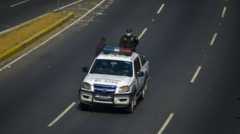
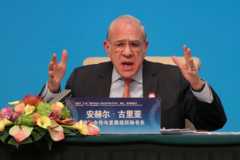

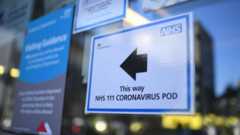




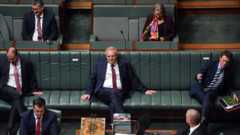
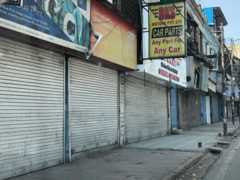

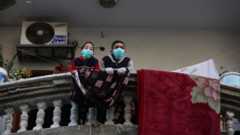
No comments:
Post a Comment